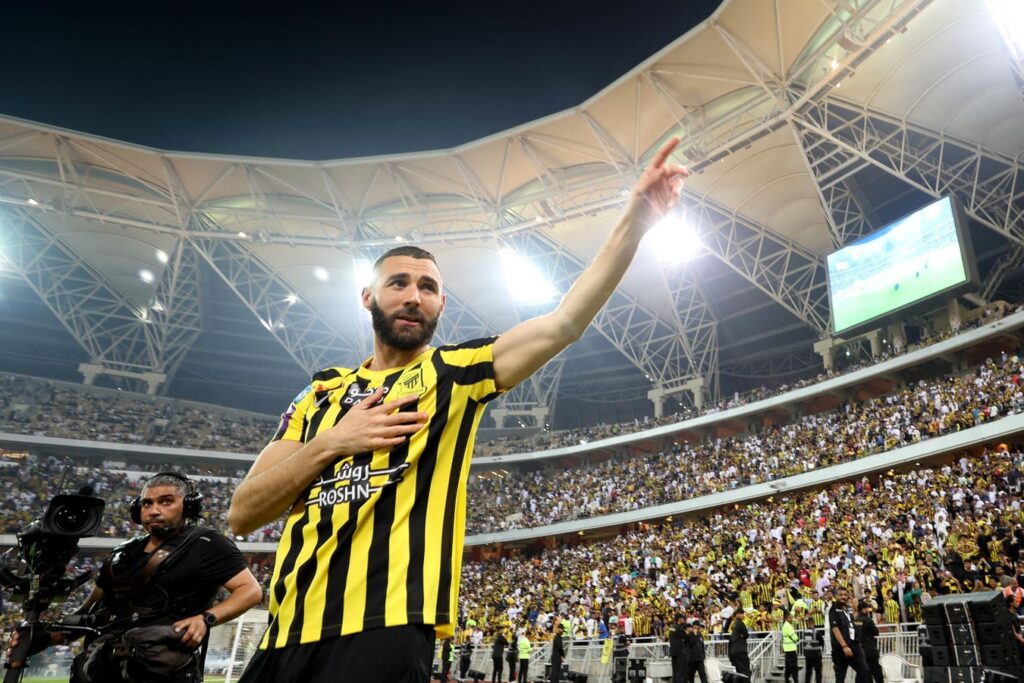JEDDAH, SAUDI ARABIA – JUNE 08: Karim Benzema is presented to the crowd at King Abdullah Sports City … More
Getty ImagesAs the summer transfer window approaches, all eyes will be on the Saudi Pro League and which big names the league can attract.
That means it will be a busy summer for Al-Ittihad’s player care relationship manager Natalia Jirala. From monitoring visa applications and sorting out SIM cars and banking, to shipping players’ cars, Jirala looks after the needs of Al-Ittihad’s superstars like Karim Benzema, N’Golo Kante and Moussa Diaby.
Diaby’s signing last summer from Aston Villa shows the new direction the Saudi Pro League is taking, targeting players in their prime rather than legends approaching the end of their careers.
And as these players can demand huge wages wherever they go, money alone isn’t enough. That’s why the Saudi Pro League has upped its efforts to make sure players enjoy their time in the kingdom.
After some teething problems signing players, the league created the Player Acquisition Center of Excellence (PACE), and as part of that, it hired player care managers centrally, before assigning them to each club. Natalia Jirala, who previously worked for the Saudi royal family, was sent to Jeddah, the Red Sea city that is home to Al-Ittihad.
Jirala’s typical day could involve researching vehicle leases and accompanying players to home viewings in the morning, having an on-site visit to the club in the afternoon, and sorting out visa applications and paperwork in the evening. Immigration and visas are more complicated than some other countries. Saudi Arabia, as a place of pilgrimage, has regularly changing visa rules and some countries such as Colombia don’t have an embassy in the kingdom.
Soccer players also have very different schedules in Saudi Arabia than in Europe as the hot climate means players typically stay inside during the day, hitting the gym or doing physiotherapy, then do outdoor training sessions at Maghrib, or sunset, which is “the best weather for practicing strenuous activities.” Matches kick off in the evening, before Saudi Arabia comes alive at night. Jirala says “all of us become a lot more nocturnal than we were back in our country.”
Also, while non-Muslims can eat during the day in the month of Ramadan, many players try not to eat around their Muslim teammates out of respect, which can be a challenge. Other Muslim practices such as not drinking alcohol are not as big of a deal as many athletes don’t drink alcohol anyway.
Soccer players are often used to a fast pace of life, where they are ready to seize an opportunity at any moment, but in Saudi culture, decisions are often made more slowly and with more consultation. Jirala says Saudis generally don’t like to say “no” to guests. Instead, they might say something like “I’ll work on that.” For Europeans used to yes/no answers, this can lead to frustration as it can “take them months to realize” that their request had actually been denied.
One of the hardest things for the players though is being away from their families. Jirala says in previous transfer windows, some signings chose not to bring their families, believing it would be difficult for them, but “the biggest of the struggles was sometimes being alone in the country for so long.”
More recent signings have brought their families along with them though. She says that “once a player can see their kids interacting with the Saudi culture and language, that is actually a gamechanger for them,” and that players’ wives often end up loving the country so much that they become “the strongest Saudi ambassadors.”
Jirala says the players’ wives fill their time pretty easily and are quick to ask for her help too. She says, in the first month, one player’s wife messaged her asking for help to organize a surprise trip to the spaceship-like Shebara resort on the Red Sea for her husband’s day off.
One of the first things a player needs is housing. They’re given a housing allowance from the club and then choose what type of accommodation they would like. In Riyadh, players often live in a gated compound community, but in Jeddah, they can often find palatial private villas near the waterfront and the city’s F1 circuit. One player even asked for a house with jetski and boat parking in the back yard.
Often, players don’t know what there is in Saudi Arabia “so they feel like bringing as much as they love and like as possible from their lives” when they move. When families bring their pets, these need things like updated vaccines for international travel, and in Saudi Arabia, large dogs, a common pet among soccer players, are seen as exotic pets with some breeds even banned from the country.
And while Saudi Arabia can cover most of the players’ needs, some things from home are irreplaceable, such as hairdressers. Once Jirala had to organize a visa for a player’s hairdresser to travel to Saudi Arabia, such are the lengths the player care managers take to keep the Saudi Pro League’s superstars happy.
Read the full article here


